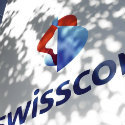
Also in today's EMEA regional roundup: EU 1, Qualcomm 0; WiFi-versus-5G-in-cars tussle takes unexpected turn; Telefónica targets IoT security.
Swisscom is ready to claim first-mover status in Europe with the imminent launch of widespread 5G commercial services on the operator's network. Smartphones from Oppo and LG (available from May and both based on Qualcomm chipsets), Samsung (from July) and Huawei (third quarter) will enable users to check out the operator's 5G services, such as shopping with augmented reality, multiplayer cloud-based gaming, real-time video collaboration and more. More 5G-compatible devices are expected to come onto the European market during the rest of the year. However, Swisscom must wait for the Swiss Federal Office of Communications to 'grant' the appropriate license before it activates the 5G network, which it has prepared in partnership with Ericsson -- the license is set to be approved next month. Swisscom currently has its 5G network ready in 43 towns and cities and says it will offer 5G services nationwide by the end of this year. (See Eurobites: Swisscom Bangs Its 5G Cowbell.)
In other Qualcomm news, Reuters reports that the chip giant has lost its legal appeal against a demand for it to provide EU regulators with data related to an antitrust case involving software maker Icera. (See Eurobites: Qualcomm May Face EU Antitrust Probe.)
A key committee of EU lawmakers has rejected a proposal from the European Commission pushing for the use of WiFi-based technology in connected cars over a rival 5G-based variant. As Automotive News Europe reports, the European Parliament's transport committee said the bias towards WiFi would act as a drag on innovation. Meanwhile, Reuters reports that the GSMA has added its voice to the industry clamor for EU endorsement of the 5G-based approach, saying that WiFi was an old standard that would not help reduce accidents.
Still in the connected-car realm, Nokia's licensing practices on patents relating to this area have been the subject of an official EU-directed complaint by Bury -- not the northern English town famous for its vegetarian-scaring black puddings, but a German electronics firm. As Reuters reports, carmaker Daimler has already lodged a similar complaint.
Telefónica is trumpeting a new initiative, the IoT Cybersecurity Unit, which, as its name suggests, is focused on making the Internet of Things a safer place. A part of this will see Telefónica, via its ElevenPaths cybersecurity unit, expanding its collaboration with analytics specialist Subex, enabling, it is hoped, the better detection of threats in data generated by IoT devices.
Telefónica Deutschland, which, like its UK counterpart, trades as O2, is launching an OTT TV streaming service with Waipu.TV. As Broadband TV News reports, the service will be offered on smartphone, tablet, PC, laptop and suitably dongled TV for €4.99 (US$5.62) per month, giving access to a line-up of more than 100 channels, more than 70 of them in HD.
BT has chosen Nokia's 7750 SR-s platform to play a key role in the packet transport network that will support the operator's FTTP and 5G mobile deployments. The platform is based on Nokia's FP4 silicon and, according to Nokia, BT is one of the first operators in the world to give it house room.
Orange has landed a five-year WAN contract with Polynt, a provider of chemical composites used in the production of plastics, paints, inks and adhesives. The new infrastructure will connect 44 sites in 15 countries across four continents.
France's Bouygues Telecom Entreprises has turned to Versa Networks to help it target the SD-WAN market. The first pilots for Bouygues' SD-WAN offer are planned for the spring, with the product being launched next fall. The deal is evidence that Versa is starting to make inroads into the European market. (See Next Stop for Versa Networks – Europe.)
The UK's Virgin Media Business is introducing what it calls its Flexi Filter service to wholesale customers on its carrier network. The service, powered by Infinera, is meant to extend customers' access networks, overcoming certain connectivity constraints.
— Paul Rainford, Assistant Editor, Europe, Light Reading
Read more about:
EuropeAbout the Author(s)
You May Also Like











